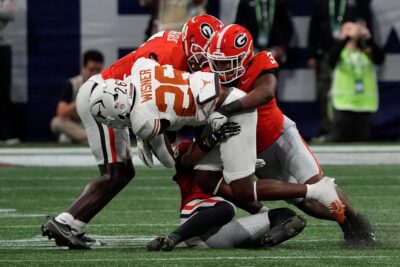Ad Disclosure
HOOVER, Ala. — One of the biggest headlines for Missouri this offseason is replacing starting defensive ends Michael Sam and Kony Ealy.
The two combined for 19.5 sacks and 34 tackles for loss as Sam earned SEC Defensive Player of the Year honors and Ealy secured a spot in the second round of the NFL Draft.
The Tigers’ pass rush, though, shouldn’t be a major concern. Markus Golden and Shane Ray are two of the six best defensive ends in the SEC this season, according to ESPN’s Chris Lowe. Much like Sam in 2012, the pair spent last season as significant and productive backups. Golden played more than one-third of the snaps.
Ray, in particular, is built more like a 3-4 outside linebacker. He finished second on the team with 11 quarterback pressures and at 6-foot-3, 245 pounds, is built to rush the passer.
But Missouri’s rush defense ranked 14th in the nation prior to the SEC Championship against Auburn and quietly was a major reason that the Tigers finished 12-2 with a Top 5 team.
Ray is 30 pounds lighter and one inch shorter than Ealy, causing Athlon Sports to speculate defensive tackle Harold Brantley could see time at end. Whomever plays at end will need to hold the point of attack, help out an unheralded group of linebackers and try to replicate the stout rush defense from a season ago.
Missouri also has developed tremendous depth along the defensive line in recent seasons, allowing the unit to continue its trajectory despite losing players like Sheldon Richardson. This year, though, the backups are a pair of redshirt freshmen who need to develop immediately if Missouri wants to continue its frequent rotation.
“I saw Marcus Loud and Charles Harris the other day. Two backup defensive ends that I think have the potential to be great players by the time they leave Mizzou. I said, ‘This isn’t about playing well in two or three years, we need you playing well this year,'” coach Gary Pinkel said. “In a very positive way I said it to them.
“We’ve been fortunate on the defensive line for the past eight years, first‑round, second‑round draft picks, and we’ve produced at a high level. Craig Kuligowski is our defensive line coach. (Loud and Harris) are both 6-foot-5, 6-foot-6, 250 guys that can potentially be great players. We like to play more than two players. The depth of those young players, certainly we need them to produce.”
• Missouri lost its top three receivers, accounting for 167 catches for 2,468 yards and 25 touchdowns, with the biggest blow coming when Dorial Green-Beckham couldn’t stay out of trouble and got dismissed from the team. On Wednesday, Pinkel suggested the Tigers will target running backs and tight ends more frequently in the passing game.
Pinkel also called Bud Sasser, Darius White and Jimmie Hunt, all seniors and expected to start, by name.
“We don’t have to replace a receiver to a receiver necessarily. There are other ways we can go,” Pinkel said. “That’s our challenge getting into August, how we’re going to handle that.”
• Pinkel had some interesting things to say about the pace-of-play debate this offseason, keyed by Bret Bielema and Nick Saban.
“I just know this, OK: Never once in all those years in the fastest league I think that plays football in the Big 12 did I have my team doctor, my trainer, any of my coordinators walk into my office and say, I’m concerned about the health of our football team. It didn’t happen ever. Didn’t happen last year or the year before.
“It’s another form of football. I think it’s great that that’s another component to football and being creative. But I don’t buy the health issue in any way. It’s never happened. No one has ever come into me all those years and said, ‘Gosh, I’m really concerned about the health of our teams playing these fast‑paced offenses.’ I think it’s fiction.”
• Pinkel gave the University of Missouri and his football program a bit of a pat on the back when asked about the way the team handled Sam’s announcement about his sexual orientation.
“I hope five years from now, you know, there’s no discussions about this, that we’ve moved on, we respect people for what they are and what they do,” Pinkel said.
An itinerant journalist, Christopher has moved between states 11 times in seven years. Formally an injury-prone Division I 800-meter specialist, he now wanders the Rockies in search of high peaks.




